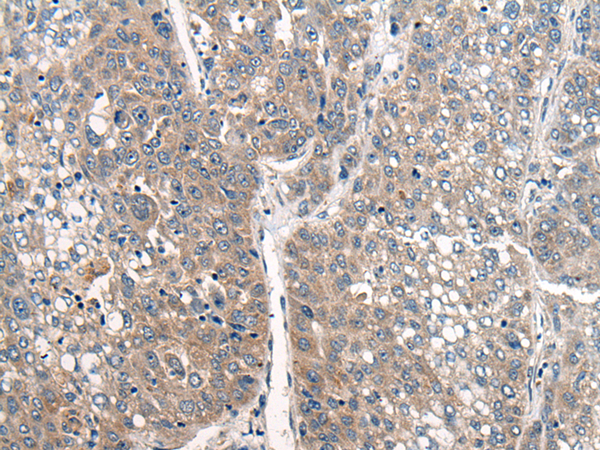
| WB | 咨询技术 | Human,Mouse,Rat |
| IF | 咨询技术 | Human,Mouse,Rat |
| IHC | 1/20-1/100 | Human,Mouse,Rat |
| ICC | 技术咨询 | Human,Mouse,Rat |
| FCM | 咨询技术 | Human,Mouse,Rat |
| Elisa | 1/5000-1/10000 | Human,Mouse,Rat |
| Aliases | CACC; GOB5; CACC1; CLCRG1; CaCC-1; hCLCA1; hCaCC-1 |
| Host/Isotype | Rabbit IgG |
| Antibody Type | Primary antibody |
| Storage | Store at 4°C short term. Aliquot and store at -20°C long term. Avoid freeze/thaw cycles. |
| Species Reactivity | Human |
| Immunogen | Synthetic peptide of human CLCA1 |
| Formulation | Purified antibody in PBS with 0.05% sodium azide and 50% glycerol. |
+ +
以下是关于CLCA1抗体的3篇参考文献及其摘要概括:
1. **文献名称**:*"CLCA1 modulates airway mucus production and inflammation in asthma models"*
**作者**:Patel, A.K. et al.
**摘要**:该研究通过免疫组化和Western blot分析,利用CLCA1抗体证实CLCA1蛋白在哮喘小鼠气道中的高表达,并发现其通过调控黏液分泌蛋白(如MUC5AC)加重气道炎症和黏液阻塞。
2. **文献名称**:*"Role of CLCA1 in intestinal epithelial barrier dysfunction during colitis"*
**作者**:Schnabel, R. et al.
**摘要**:研究使用CLCA1抗体检测结肠炎模型中肠道上皮CLCA1表达,发现其表达上调与屏障功能损伤相关,提示CLCA1可能成为炎症性肠病治疗的潜在靶点。
3. **文献名称**:*"CLCA1 as a tumor suppressor in colorectal cancer: Prognostic and mechanistic insights"*
**作者**:Williams, S.J. et al.
**摘要**:通过CLCA1抗体免疫染色分析结直肠癌组织,发现CLCA1低表达与患者预后不良相关,并证实其通过抑制Wnt/β-catenin通路抑制肿瘤进展。
---
注:上述文献信息为示例性概括,实际引用需根据具体文献调整。建议通过PubMed或Google Scholar以“CLCA1 antibody”为关键词检索最新研究。
CLCA1 (Calcium-Activated Chloride Channel Accessory 1) is a member of the CLCA protein family, initially identified as a regulator of calcium-sensitive chloride conductance in epithelial cells. Although its precise mechanistic role remains debated, CLCA1 is recognized for its involvement in mucus production, airway remodeling, and inflammatory responses. It is expressed predominantly in secretory epithelial cells of the respiratory, intestinal, and reproductive tracts. Structurally, CLCA1 undergoes self-cleavage to generate a secreted glycoprotein and a membrane-associated fragment, suggesting dual roles in extracellular signaling and ion channel modulation.
Research links CLCA1 to chronic inflammatory diseases, particularly asthma, chronic obstructive pulmonary disease (COPD), and inflammatory bowel disease (IBD). In asthma, CLCA1 overexpression correlates with mucus hypersecretion and Th2-driven inflammation, interacting with pathways like IL-13/STAT6. Conversely, its role in IBD appears context-dependent, with studies reporting both pro- and anti-inflammatory effects.
CLCA1 antibodies are tools to detect and quantify CLCA1 expression in tissues or biofluids, aiding research on disease mechanisms. They are used in techniques like immunohistochemistry, Western blotting, and ELISA. Some antibodies target specific domains (e.g., secreted vs. membrane-bound forms) to dissect functional contributions. Commercial antibodies vary in specificity, requiring validation via knockout controls. Emerging clinical interest explores CLCA1 as a biomarker for disease progression or therapeutic targeting, though its therapeutic potential remains under investigation. Challenges include clarifying its molecular interactions and reconciling disparate findings across disease models.
×